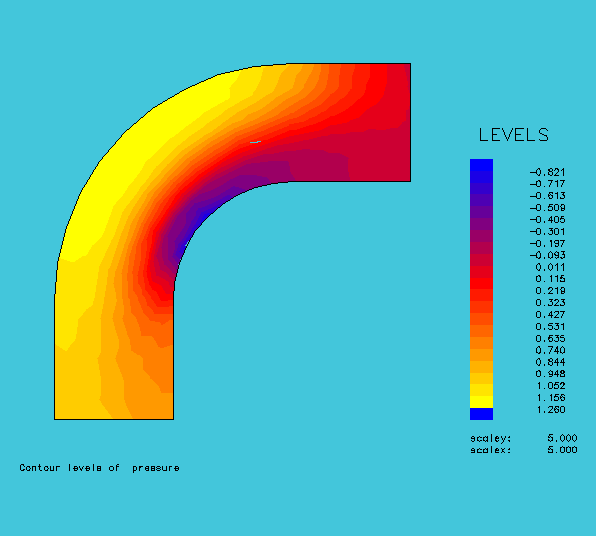Computational Fluid Dynamics II
January 27 - 31, 2025.
(a PhD course from the
JM Burgerscentrum)
Teachers:
Prof.dr.ir. C.
Vuik
and
Prof.dr.ir. F.J. Vermolen
Subjects: Finite element methods for the incompressible Navier-Stokes
equations and iterative solution methods.
Finite element methods for the incompressible Navier-Stokes
equations
A short introduction to the finite element method is given.
The following fluid flow applications are used: Poisson equation,
convection-diffusion equation and the incompressible Navier-Stokes
equations. Subjects studied in more detail are: (streamline) upwind
methods, problems originating from the incompressibility condition,
and the linearisation of convective terms in the Navier-Stokes
equations.
Some remarks are given on time-dependent problems.
Iterative solution methods.
The solution of systems of linear equations. The main part of the
course is devoted to modern iterative methods. Furthermore the
following related topics are considered:
- direct and iterative methods for (sparse) linear systems,
- iterative methods to compute eigenvalues of matrices,
- implementation of these methods on vector- and parallel
computers.
As applications systems are used which originate from fluid flow
problems.
Further information:
jmburgerscentrum@tudelft.nl

The pressure contour lines for an incompressible flow through a bend.


Information related to Computational Fluid Dynamics II
(a PhD course from the
JM Burgerscentrum)

In the
netlib library many software packages are available
to solve linear algebra problems.

Some links to software for parallel computing.
-
BSP Worldwide is an association of people interested in the
development of the Bulk Synchronous Parallel (BSP)
computing model.
-
CUDA
is NVIDIA's parallel computing architecture that enables dramatic increases in computing performance by harnessing the power of the GPU (graphics processing unit).
Our activities on
GPU computing.
-
MPI is a new library specification for message-passing, proposed as
a standard by a broadly
based committee of vendors, implementors, and users.
-
OpenMP supports multi-platform shared-memory parallel programming
in C/C++ and Fortran on all architectures, including Unix platforms and
Windows NT platforms.
-
Cilk is a language for multithreaded parallel programming
based on ANSI C.

Below we give some links to firms who makes vector and/or
parallel computers.
TOP500 Supercomputer Sites lists the sites that have the 500 most
powerful computer systems installed.

The Grid is an emerging infrastructure that will fundamentally change
the way we think about - and use - computing. The Grid will connect
multiple regional and national computational grids to create a universal
source of computing power. A computational grid is a hardware and
software infrastructure that provides dependable, consistent, pervasive,
and inexpensive access to high-end computational capabilities.
For
further information see:

Some links to interesting books or reports.
- Matrix Computations (fourth edition)
Gene H. Golub and
Charles F. Van Loan
Johns Hopkins University Press, Baltimore, 2013
- Templates for the Solution of
Linear Systems: Building Blocks for Iterative Methods
Richard Barrett, Michael Berry, Tony F. Chan, James Demmel,
June Donato, Jack Dongarra, Victor Eijkhout, Roldan Pozo,
Charles Romine, and Henk Van der Vorst
SIAM, Philadelphia, 1994
The pdf-file of this book can be obtained in the following way:
Click on the templates/templates.pdf link at the
templates index page.
-
Finite element methods and Navier-Stokes equations,
C. Cuvelier and A. Segal and A.A. van Steenhoven,
Reidel Publishing Company, Dordrecht, 1986.

Contact information:
Kees Vuik

Back to
home page or
educational page of Kees Vuik
![]()
![]()

![]()
![]()
![]()
![]()
![]()
![]()
![]()
![]()